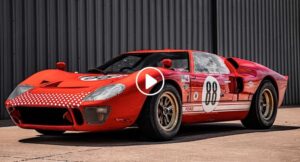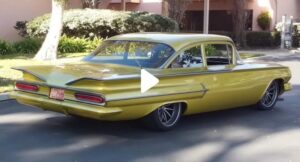The 1969 Chevrolet Corvette Stingray is an iconic symbol of American automotive design and engineering. This classic car is not just a vehicle; it is a testament to a time when American muscle cars reigned supreme. The Corvette Stingray’s combination of style, performance, and luxury made it a standout among its contemporaries and has since solidified its place in automotive history.
Design and Styling
The 1969 Stingray was the third iteration of the Corvette, known as the C3. It was introduced in 1968 and remained in production until 1982. The Stingray featured dramatic styling that was a significant departure from previous models. Its design was inspired by the Mako Shark II, a concept car that had been unveiled by General Motors in 1965.
Larry Shinoda, the chief designer, gave the Stingray its distinctive, aggressive look. The car was wider and lower than its predecessor, with a long, pointed front end and a short, sharp tail. The body had a flowing, curvaceous design, with flared wheel arches and a tapering rear end. Its most recognizable feature was the split rear window, a unique design element that added to its futuristic look.
The Stingray was available as either a coupe or a convertible. The coupe featured removable roof panels and a removable rear window, giving owners the option to enjoy open-air driving. On the other hand, the convertible came with a detachable hardtop, allowing for all-weather driving.
Interior of the 1969 Chevrolet Corvette Stingray
The interior of the 1969 Chevrolet Corvette Stingray is a testament to the car’s blend of sportiness and luxury. The Stingray was designed with both comfort and performance in mind, and this is reflected in its interior features and amenities.
Seating and Comfort
The 1969 Corvette Stingray featured bucket seats as standard, offering a perfect blend of comfort and support for spirited driving. The seats were upholstered in either vinyl or leather, depending on the buyer’s preference, and had headrests as a standard feature for the first time.
The cabin was spacious for a two-seater sports car, providing ample legroom and headroom for both the driver and passenger.
Instrumentation and Controls
The Stingray’s driver-focused cockpit featured a comprehensive array of gauges and controls. The dashboard housed a large speedometer and tachometer, flanked by smaller gauges for fuel level, coolant temperature, oil pressure, and battery charge. These gauges were designed with clear, easy-to-read markings, allowing drivers to monitor the car’s performance at a glance.
The center console housed the controls for the heating and ventilation system, as well as the radio. Depending on the options chosen, the Stingray could also come with an AM/FM radio, an 8-track tape player, or even a sophisticated (for the time) cassette player.
Performance
Under the hood, the Stingray was a true muscle car. It came with a choice of several V8 engines, ranging from the base 300 horsepower 350 cubic inch (5.7L) to the powerful 435 horsepower 427 cubic inch (7.0L). The engine was paired with either a three-speed automatic or a four-speed manual transmission. The Stingray was capable of accelerating from 0 to 60 mph in less than 6 seconds, an impressive feat for a car of its size and weight.
The Stingray also featured advanced handling and braking systems for its time. It had independent suspension on all four wheels, a feature that was rare among American cars of the era. This, combined with the car’s low center of gravity, gave it excellent cornering ability. Furthermore, the Stingray was one of the first American cars to feature disc brakes on all four wheels, providing superior stopping power.
Customization Options
Buyers of the 1969 Stingray had a wide range of options to choose from, allowing them to customize the car to their liking. Chevrolet offered several different engine options, each with its own unique characteristics. The base 350 cubic inch (5.7L) V8 offered a balance of performance and fuel economy, while the powerful 427 cubic inch (7.0L) V8 provided exhilarating acceleration and top speed.
Chevrolet also offered several optional extras for the interior. These included a range of different upholstery options, a choice of several different radios, and even an optional custom interior package that included leather seat trim, wood-grain accents, and special carpeting.
Cultural and Social Influence
The Stingray didn’t just make waves in the automotive world; it also made a significant cultural impact. It was seen as a symbol of the American spirit – bold, powerful, and innovative. The car was frequently featured in movies, TV shows, and advertisements, often as a representation of success and aspiration.
The Stingray was also associated with the counterculture and the spirit of rebellion that characterized the late ’60s. Its aggressive styling, powerful performance, and luxurious features made it a desirable symbol of freedom and individuality.
Legacy
The 1969 Chevrolet Corvette Stingray has become a coveted collector’s item. Its unique design, impressive performance, and iconic status make it a favorite among classic car enthusiasts. The Stingray’s influence can be seen in subsequent Corvette models, which have continued to push the boundaries of design and performance.
In conclusion, the 1969 Chevrolet Corvette Stingray is a testament to a time when American cars were bold, powerful, and stylish. The Stingray is not just a car; it’s a piece of automotive history, a symbol of an era when American design and engineering were at their peak. It remains a beloved classic, a testament to the enduring appeal of the American muscle car.
The Stingray embodies the spirit of the Corvette brand – a commitment to performance, style, and above all, the pursuit of driving pleasure. In its day, it was a dream car for many, and today, it remains a symbol of the golden age of American automotive design. The 1969 Chevrolet Corvette Stingray, with its unique blend of power, style, and luxury, is a classic that continues to captivate car enthusiasts around the world.
The 1969 Chevrolet Corvette Stingray, with its sleek lines, muscular power, and luxurious amenities, is a shining example of what made the American muscle car era so special. It remains a timeless symbol of American automotive excellence, a car that not only defined its era but also transcended it. It’s more than just a car; it’s a piece of American history, a testament to a time when the open road was a place of freedom and adventure, and the Corvette was the perfect companion for the journey.





